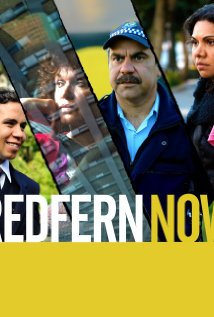
REDFERN NOW
Australia, 2015, 90 minutes, Colour.
Deborah Mailman, Wayne Blair, Rarriwuy Hick, Lisa Flanagan, Anthony Hayes, Danniella Farinacci, Tiriel Mora.
Directed by Rachel Perkins.
Redfern Now was an experiment for Australian television, a series about urban aborigines in central Sydney, Redfern, with aboriginal actors, writers and directors, including veterinary Rachel Perkins has directed this television film based on the series. It stars two fine aboriginal actors, Deborah Mailman, excellent in this film as a single mother, bringing up children, doing cleaning work for cash in hand and being brutally raped and Wayne Blair, director of The Sapphires, also with Deborah Mailman, plays the father of a young woman was raped and is a local police officer. Also in the cast is Anthony Hayes as the rapist. Rarriwuy Hick plays the daughter.
The film is quite graphic in its presentation of sexual violence against women, and dramatises the different responses, the daughter who does not want anybody to know, destroys the evidence and gets her father to keep it secret. On the other hand, there is the mother who is very strong, takes the mobile phone from the pocket of the rapist and is able to offer it in evidence, gives a clear explanation of what had happened, is attacked in the courtroom as being a fraud because of getting cash deals which she says she will repay. And Anthony Hayes, a versatile actor, is brutal in the rape sequences and is a picture of innocence as he describes himself as a victim in the court scenes.
The film offers a lot of local colour, is also an opportunity for a white Australian audience – and beyond – to see something of aboriginal life in the cities. It is also a strong contribution to films about sexual violence against women, the experience of rape and its, and the role of the courts.
1. The popularity of the television series, breakthrough drama, aboriginal themes, characters, performance, urban aboriginal stories, conflicts and resolutions?
2. Redfern, the streets, homes, police station, courts? Redfern and the look? The musical score?
3. The girls at King’s Cross, taxis refusing them, walking home, the dark, the emergence of the rapist, his threats, choking Robyn, fleeing?
4. The effect on Robyn, quiet, Dad watching television, talk, having the shower, burning the clothes, destroying the evidence, wanting everything secret? Aaron and his not reporting, safeguarding her as a father? Going to see Allie, coming to the house, telling her daughter? Warning Aaron? The clashes? Robyn going to the medical centre, the lectures by the doctor about safe sex, Robyn’s angry outburst about being raped?
5. Lorraine, her work, cleaning, cash in hand, less than promised? The children and support? The drunken husband? Her kicking him out? Walking home, the rape, the dark, her reaction, resistance, taking the rapist’s phoning, calling her children, calling the police? Going home, the effect on her daughter?
6. Aaron, policeman, his work, cars and patrol, his silent partner, Lorraine and the personal impact, tracing the phone, arriving at the rapist’s house, arresting him? His wife and children?
7. Hopkins, his age, marriage, accountant, his family, his brutal attack on both Robyn and Lorraine?
8. Lorraine, her determination, the police, giving a clear account? The medical attention? Talking to Robyn, Robyn giving information, Lorraine guessing what had happened?
9. The trial, Aaron and Robyn going? The defendant? The prosecution, accusing Lorraine of fraud, of being a liar? Lorraine and her defence, claiming she was honest, supporting her family, paying back? The judge and his interventions for her? The aggression of the prosecutor?
10. Lorraine’s husband, turning up again, her hitting him, her love for him, minding the children?
11. Robyn going to the court, unable to stay, leaving, waiting?
12. Aaron and Allie, the clashes, the confrontation, the proposal, the refusal, the final acceptance and her suggestion?
13. Hopkins, his story, the lies, putting himself in a plausible light and as an innocent? Confessing the sexual encounter, but in being repentant, accusing Lorraine of approaching hinm?
14. Lorraine, walking home, Robyn waiting, the guilty verdict, their embrace?
15. Aboriginal themes in characters, contemporary, society?
16. Themes of women, violent men, rape, the effect of sexual violence? Greater audience awareness?